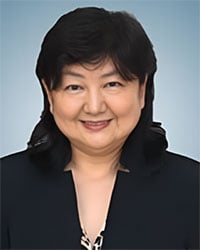An Interview with Weili Lu
By Expanding Horizons Editors
Expanding Horizons, April 2024

This month, Expanding Horizons had the opportunity to interview Weili Lu, the 2023–2024 president of the American Risk and Insurance Association (ARIA).
Expanding Horizons (EH): Congratulations on being elected as the 2023-2024 ARIA president. Can you tell us about your background?
Weili Lu (WL): I earned my Ph.D. in Risk Management and Insurance (RMI) from the University of Illinois at Urbana-Champaign (UIUC). Currently, I am a finance professor, chair of the Finance department, and the director of the School of Risk Management and Insurance at Cal State University Fullerton (CSUF).
I grew up in southeast China as the youngest of three siblings. However, I went to northern China for my bachelor’s and master’s degrees in economics at Nankai University. I met Professor Robert Mehr from UIUC, who later guided me to study risk management and insurance in the US. By then, I was the first Chinese woman to receive a Ph.D. in risk management and insurance.
EH: How did you get into the profession?
WL: I stumbled into it. After I received my master’s degree, I was assigned a job as a lecturer in the finance department of Nankai University in Tianjin, China. I was told to teach insurance. I asked the department chair what it was, because the word had the same pronunciation in Chinese as the term for “safety box.” Instead of answering my question, he asked me, “Can you read English?” I said, “Yes.” Then he told me to find an English text and translate it. I found C. Arthur Williams’s Principle of Risk Management and Insurance, and that was the beginning of my RMI teaching career.
In a twist of fate, my journey took a significant turn during the summer when Professor Robert Mehr visited our university. He played a crucial role in facilitating my transition to the United States, where I pursued a Ph.D. in Finance with a specialization in Risk Management and Insurance at UIUC.
EH: What challenge did you encounter as an insurance/risk management researcher?
WL: As an insurance and risk management researcher, my work heavily relies on empirical analysis, making data acquisition a critical aspect of my endeavors. One prominent challenge faced in the field is the absence of a unified database, a stark contrast to the comprehensive databases available in finance. Two decades ago, even with the acquisition of the National Association of Insurance Commissioners (NAIC) database, the process proved to be cumbersome and time-consuming.
In the early stages of my research, obtaining relevant data on topics such as employee stock ownership plan (ESOP) announcements, demutualization, compensation and mergers and acquisitions (M&A) posed a significant hurdle. This necessitated multiple visits to the library, where I often found myself waiting in line for access to a limited number of computers with databases. The entire process, from data collection to processing, demanded a substantial investment of time and effort.
Fortunately, there has been a positive evolution in the landscape of databases attributed to the advancements in artificial intelligence (AI) and machine learning. The maturity of databases in recent years has significantly alleviated the challenges I faced during my earlier research, enabling more efficient and streamlined data access and analysis.
 EH: You have a lot of academic achievements. What are the most important ones?
EH: You have a lot of academic achievements. What are the most important ones?
WL: One of my most significant academic achievements was the successful completion of my Ph.D.—a journey marked by determination, perseverance and unwavering support from my advisors and family. I had the privilege of studying under the guidance of my esteemed mentors, Drs. Stephen D’Arcy and Phelim Boyle. Despite facing challenges in my quantitative background due to historical reasons, they dedicated considerable time to helping me enhance my skills. Their mentorship extended beyond research techniques, instilling in me the essential academic principles integral to meaningful scholarly work. Balancing the demands of the program while raising two children was challenging, but their support and encouragement never wavered, for which I remain deeply grateful.
Another noteworthy achievement was the establishment of the School of Risk Management and Insurance at CSUF. From its inception, we embarked on a journey of growth, starting from the ground up. Today, the school boasts two undergraduate concentrations in RMI and Actuarial Science, along with an MBA program featuring an RMI concentration. Over the course of 25 years, we’ve successfully placed over 2,500 students with local insurance carriers and brokers. Notably, we’ve awarded approximately $1.35 million in scholarships, demonstrating our commitment to fostering academic excellence. The RMI and Actuarial Science programs have flourished, offering a total of 16 specialized courses.
These milestones underscore my dedication to academic and professional development, and I am proud to have contributed to the growth and success of our school.
EH: Any personal philosophy with regard to research and teaching?
WL: In the realm of research and teaching, my personal philosophy centers around persistence—a quiet, unwavering commitment to the journey. I believe that true success is not always presented to the most naturally gifted or the quickest minds. Instead, it often finds its way to those who navigate the path with steadfast determination and an aversion to surrender.
My academic milestones, such as the completion of my Ph.D. and the attainment of tenure, unfolded over an extended period. This lengthy journey, marked by its unique challenges, has been a testament to the peaceful strength of persistent dedication.
EH: What would you suggest to or advise someone just entering the profession in either the industry or academia?
WL: For individuals entering the profession, whether in the industry or academia, I would highly recommend considering RMI as a dynamic and rewarding field. It offers a diverse and ever-changing landscape, making it a practical and engaging field to be a part of. The constant evolution of risks and challenges introduces a continuous stream of opportunities for research and exploration.
One key piece of advice is to embrace the innovation and practicality of RMI. The industry is characterized by a variety of risks, both known and unknown, providing a fascinating backdrop for research and teaching. Take, for instance, the emergence of cyber risk, an evolving threat with significant implications. Engaging in research within this field not only adds value to academia but also contributes to the industry’s ability to navigate and address these emerging challenges.
EH: What is your vision about the future of the insurance/risk research?
WL: My vision is one that is both bright and challenging, marked by several key factors that will shape the industry, including catastrophic risks in traditional insurance lines, AI and data analytics and interdisciplinary collaboration.
In sum, the future of insurance and risk research holds promise and excitement. Researchers will need to navigate a field where adaptability, innovation and collaboration are key. By staying attuned to evolving risks, embracing technological advancements, and maintaining a commitment to ethical considerations, the industry is poised to contribute significantly to understanding and managing risks in an ever-changing world.
EH: What do you see as the biggest challenge of the profession?
WL: I think that technology poses one of the most significant challenges in the insurance profession. Its transformative impact spans all facets of the industry, presenting both opportunities and complexities that demand careful consideration. An example of those challenges are rapid innovation, a strong impact on traditional business lines, data privacy and cybersecurity, and ethical and regulatory considerations.
Addressing these challenges involves a holistic approach that encompasses technological literacy, ethics, regulatory frameworks, and a proactive mindset to ensure that the profession evolves in a way that benefits both industry stakeholders and consumers.
EH: Why and how do you think the insurance industry should support academic research?
WL: Academic research can be a valuable resource to solve the challenges the insurance industry faces. Through rigorous research methodologies, academics can delve into emerging trends, risks and opportunities, providing the industry with a deeper understanding of market dynamics. The insurance industry gains access to a pool of intellectual capital in academic research. It is a win-win situation. Researchers bring fresh ideas, methods and technologies that can lead to the development of cutting-edge products, services and risk management practices. By fostering a collaborative environment, the industry can stay at the forefront of innovation and remain competitive.
Academic researchers often require access to industry-specific data and funding to conduct meaningful studies. The insurance industry can play a pivotal role by providing researchers with the necessary data and financial support. This collaboration not only accelerates the research process but also ensures that the findings are grounded in real-world scenarios.
EH: What might someone be surprised to know about you?
WL: Someone might be surprised to know that I have a rich history as a track runner, having been a part of varsity teams in junior high, high school, and college. My specialization was in the challenging 800- and 1,500-meter events. Engaging in competitive running has been a significant part of my life and has left a lasting impact on who I am today.
Statements of fact and opinions expressed herein are those of the individual authors and are not necessarily those of the Society of Actuaries, the editors, or the respective authors’ employers.
Weili Lu, Ph.D., is the founder and director of California State University’s Fullerton School of Risk Management and Insurance and also serves as the Finance department chair. Weili can be reached at wlu@fullerton.edu.
